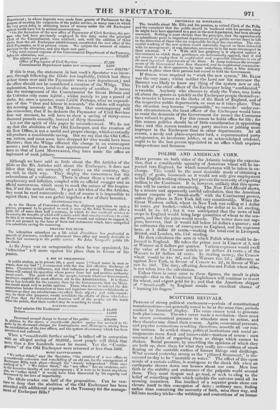POLISH AND AMERICAN CORN.
MANY persons on both sides of the Atlantic indulge the expecta- tion, that a considerable quantity of American wheat will be im- ported into England, for which manufactures will be taken in ex- change. This would be the most desirable mode of obtaining a supply of grain, inasmuch as it would not only give employment to the English working classes, but prevent the necessity of exporting bullion to the Continent. It is, however, unlikely that this opera- tion will be carried on extensively. The New York Herald shows, by a minute and apparently careful calculation, that the American cannot compete in "bread-stuffs" with the Continental grower, unless the prices in New York fall very considerably. When the Great Western sailed, wheat in New York was selling at 1 dollar 25 cents. per bushel,—which, taking the dollar at 4s. 4d. sterling, would be 5s. 5d. ; but it was anticipated that the news of bad crops in England would bring large quantities of wheat to the sea- ports, and that the price would recede. The writer does not sup- pose, however, that it would fall below 10 dollars a quarter; and Ise estimates the cost of conveyance to England, and the expenses here, at 1 dollar 29 cents,—making the total cost in Liverpool, Bristol, and London, 488. 11d. sterling.
He then calculates the sum at which Polish wheat could be de- livered in England. He takes the prime cost in Cracow at 5, and at Warsaw at 6 dollars per quarter. Various expenses would swell the value of the Cracow article to 10 dollars 34 cents,. of the Warsaw to 10 dollars 42 cents. In sterling money, the Cracow wheat would be 44s. 9d., and the Warsaw 45s. ld.; difference as against New York, in favour of Cracow 4s. 2d., in favour of War- saw 3s. 10d. The duty, affecting America and Polish wheat alike, is not taken into the calculation.
Unless there is some error in these figures, the result is plain enough—that to the Continent Englishmen will continue to resort for wheat, and export gold for it ; and that the American shipper of "bread-stuffs" to England stands an excellent chance of " burning his fingers."


























 Previous page
Previous page